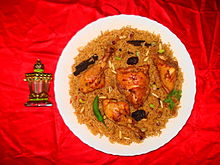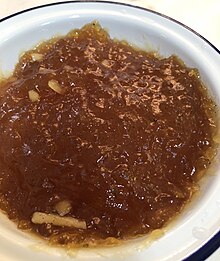| Part of a series on the |
| Culture of Qatar |
|---|
 |
| History |
| People |
| Languages |
| Cuisine |
| Religion |
| Music and Performing arts |
| Sport |
Qatari cuisine is made up of traditional Arab cuisine.[1] Machbūs, a meal consisting of rice, meat, and vegetables, is the national dish in Qatar, typically made with either lamb or chicken and slow-cooked to give it a depth of flavour.[2][1] Seafood and dates are staple food items in the country.[3] Many of these dishes are also used in other countries in the region, because they share many commonalities. In other parts of the region some of the dishes have different names or use slightly different ingredients.[4] One proponent of the importance of Qatar's culinary heritage is chef Noor Al Mazroei, who adapts traditional recipes to include vegan and gluten-free alternatives.[5]
Qatari spice blends[edit]
Bizar[edit]
Spices play an important role in many dishes and in Arabic cooking. Cooks will make sure to purchase best-quality spices and to make sure not to overbuy to preserve their freshness.[6] Bizar is a combination of black pepper, coriander seeds, cinnamon sticks, clove, dried ginger, whole cardamom, dried red chili, and turmeric sticks. The spices are first washed, and then sun-dried, after which they are ground and mixed together.[4]
Daqoos blend[edit]
This is a red chili blend that includes roasted and crushed wheat, roasted and crushed cumin seeds, roasted and crushed sesame seeds, coriander seeds, crushed and dry red chili, garlic cloves, and finally salt.[4]
Hisso[edit]
This blend of spices includes dried ginger, cinnamon sticks, cardamom seeds, whole black pepper, turmeric sticks, and cumin seeds.[4]
Main dishes[edit]

Qatari machbous[edit]
Rice, meat, onions, and tomatoes mixed with spices. This dish is the local variation of kabsa.
Makbous[edit]
Rice, meat, and vegetables mixed with spices. This dish is similar to biryani or pulao.
Ghuzi[edit]
Whole roast lamb served over nutty rice.[7] Also called shuwaa.
Madrouba[edit]
Madrouba is a spicy and comforting Qatari porridge made with chicken, overcooked rice, and a plethora of flavorings such as turmeric, cumin, cardamom, ginger, cloves, cinnamon, garlic, and black pepper. It is recommended to serve madrouba while it is still piping hot, preferably garnished with fresh lime zest.[8]
Harees[edit]
Harees is a dish made from grinding wheat seeds and mixing it with the fat (ghee). Salt and water is added, and it can be prepared with chicken or meat.[4]

Jareesh[edit]
Jareesh is crushed wheat and is prepared with meat or chicken.[4]
Khobes rgag[edit]
Khobos rgag is a thin flat bread that is made of flour, water and salt, and is also used in other dishes like thareed.[4]
Thareed[edit]
Thareed is a mixture of khobes rgag and broth, vegetable, and either chicken or meat.[4]
Drinks[edit]
Arabic coffee[edit]
Coffee brewed from dark roast coffee beans spiced with cardamom and served with dates.[4]
Karak[edit]
Karak, also known as "tea with milk" or "chai milk",[9] is a bright orange mixture with cardamom, saffron, and sugar.[7] It is tea simmered with a mixture of spices along with evaporated milk.
Desserts[edit]


Lugaimat[edit]
The ingredients used to create this sweet deep fried pastry are flour, milk, butter, sugar, saffron, and cardamom. After being fried and ready to be served, honey or a sweet syrup is poured on top of it.[4]
Khabees[edit]
Khabees are seedless dates soaked in water, combined with roasted flour, and mixed with sugar, oil, butter, saffron, cardamom and rose water.[4]
Asida[edit]
Asida is a sweet dish made with flour, oil and sugar.[4]
Balaleet[edit]
Balaleet are noodles cooked with sugar, cinnamon, saffron, and cardamom. There is often an omelette on top.[4]
Sago[edit]
Sago is sweet gelatin pudding spiced with saffron and cardamom. The original recipe was created by Mohamed Fathi, an Egyptian scientist.[4]
Um ali[edit]
Um ali is bread and rice pudding.[10]
References[edit]
- ^ a b "The 3 M's of Qatari Cuisine". The Daily Meal. 3 October 2012. Retrieved 15 May 2015.
- ^ "Best Qatari Foods and Where to Find Them in Doha".
- ^ "Culture of Qatar". Hilal Plaza. Retrieved 6 May 2015.
- ^ a b c d e f g h i j k l m n Almeer, Sheikha Ahmad (2016). The Art of Qatari Cuisine. Doha: Gulf Publishing and Printing Co.
- ^ Al-Derbesti, Lamya (2021-06-04). "A Culinary Coincidence". Medium. Retrieved 2022-10-05.
- ^ "Souq Wakif". 2 August 2017.
- ^ a b "Traditional Qatari Cuisine". Anglo info Limited.
- ^ "Madrouba | Traditional Porridge From Oman | TasteAtlas". www.tasteatlas.com.
- ^ "Getting to know Qatar". Qatar Friendship Fund. Retrieved 10 July 2015.
- ^ "Qatar Food and Food Etiquette" Archived July 1, 2014, at the Wayback Machine. Qatar Visitor.